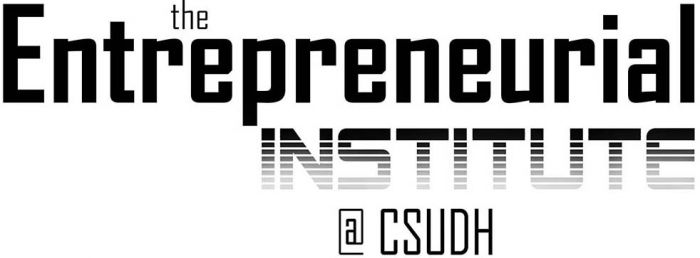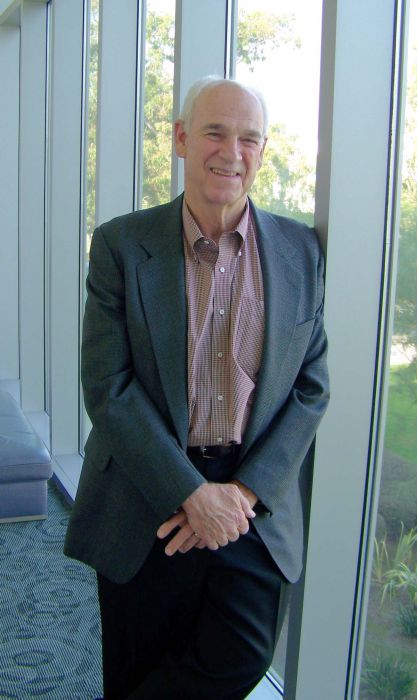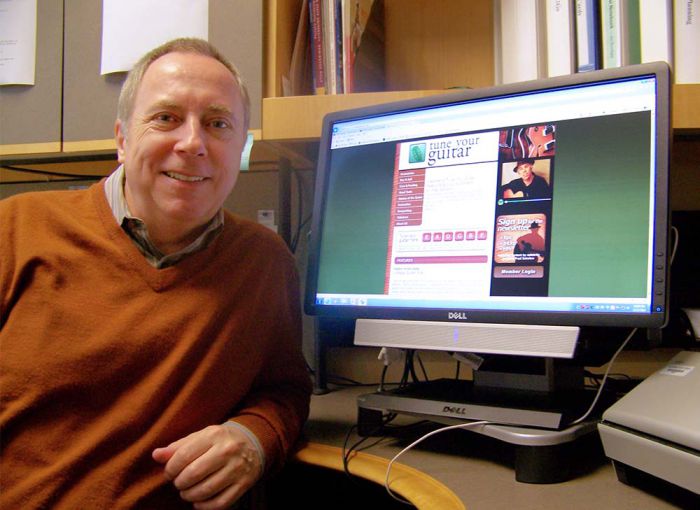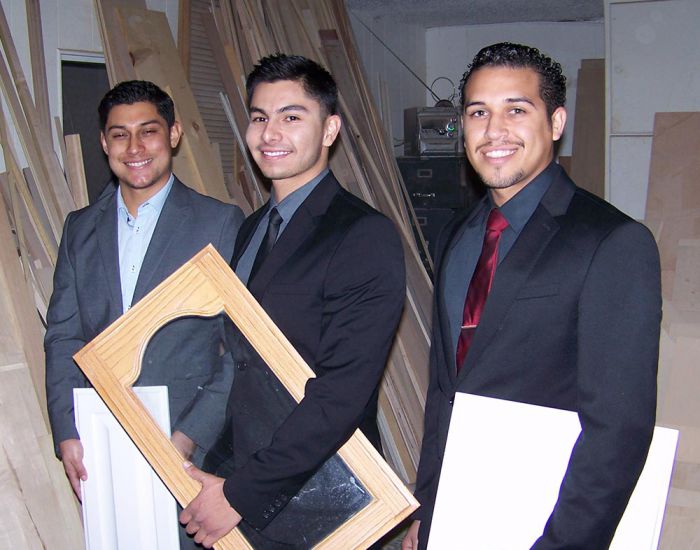

You recently launched a new website but have little marketing experience or time to promote it while teaching full-time, or maybe you are a kinesiology student who scribbled an athletic training business idea in your textbook while studying for finals last fall.
Small business problems or inspired startup ideas can materialize at any time. What’s next?
Fortunately, the entrepreneurial spirit is alive and growing at California State University, Dominguez Hills (CSUDH) thanks to the new Entrepreneurial Institute @ CSUDH.
Ushered in by CSUDH business management lecturer Michael Grimshaw, the institute provides a bastion of knowledge, creativity and collaboration to the campus community and those in the general public looking to launch or grow their entrepreneurial dreams. Grimshaw created the institute in fall 2014 while teaching MGT 412: Small Business Management/Introduction to Entrepreneurship during his second semester as a lecturer on campus.
“A lot of people have ‘great’ ideas, but the difference between a real entrepreneur and a non-entrepreneur is when the person who has an idea actually does it,” said Grimshaw. “For most people, the idea to start their own business kind of just sits. They don’t know what to do next. That’s why programs that draw that out like our new business incubator are so important for setting people in the right direction.”
Grimshaw’s curriculum grew substantially after his first semester in the spring of 2014. That semester he ambitiously hosted eight guest speakers and organized five field trips, and worked to help develop three student business startups. In fall 2014, under the umbrella of the new Entrepreneurial Institute, he added several new programs and support opportunities. They included business boot camps, scholarships, and a day-long symposium called “The American Dream Starts Here,” which concluded with the “Toro Tank” competition that was inspired by the television show “Shark Tank,” as well as an innovative business incubator.
The Ei-Incubator
One of the programs the institute launched last fall was the Ei-Incubator, a short-term program designed to promote the growth and success of entrepreneurship at CSUDH. According to the Kauffman Foundation, more than 75 percent of incubated businesses are still in business after five years, while less than 20 percent succeed without incubation. The Ei-Incubator offers mentoring, coaching, and support services such as business planning tools, legal advice, marketing strategies, business feasibility analysis and networking opportunities. It also connects entrepreneurs to venture capitalists who may be interested in investing in their businesses.
The popularity of university-based incubators is expanding nationally, yet CSUDH’s establishment of the Ei-Incubator is a bit ahead of the curve in the region with just a handful of university-based incubators currently in operation, such as those at UCLA, USC, Loyola Marymount University, and Cal State Northridge.
Last fall the Ei-Incubator took place once a week from Oct. 30 to Nov. 20. University students, faculty and staff members, and those who are not part of the campus community, presented their businesses or business ideas to Grimshaw and the students in his business management course.
“Business incubators help entrepreneurs gain real world skills, build their resume with actual multi-faceted business experience, learn valuable entrepreneurial skills in a protected environment, and–of course–provide the real possibility of generating cash flow to help participants realize their dreams,” said Grimshaw.
After the entrepreneurs presented, they met in small groups with students enrolled in Grimshaw’s course who were trained, as part of the curriculum, to assess each company or idea and provide feedback and advice. Grimshaw and Gary Polk, a business management and marketing lecturer at CSUDH who helps lead the institute at the university, provided oversight throughout the business evaluation process.

One incubator presenter was Jim Bouchard. Recently retired after serving as director of the Osher Lifelong Learning Institute (OLLI) at CSUDH, Bouchard shared his website tuneyourguitar.com during the second session. He created the site several years ago, but couldn’t find the time to grow the business while working full-time.
“The incubator really made me think in terms of developing strategies for what direction my business will go,” said Bouchard. “Some of the most important things I’m working on now, as a result of the incubator, are my mission statement and vision for the company–to help put me in the right direction over the next five years. I also need an exit strategy to help me best define how far I should take the business and what my ultimate goal with tuneyourguitar.com is.”
South Bay Entrepreneurial Center
The Ei-Incubator graduation ceremony was held during Global Entrepreneurship Week, Nov. 17-23, but for many of the presenters the support didn’t stop there.
Grimshaw, who has served on the CSUDH College of Business Administration and Public Policy (CBAPP) advisory board for the past five years, is no newcomer to business incubators. He has been operating one for the past five years at the South Bay Entrepreneurial Center (SBEC) in Torrance. The SBEC brings together expert volunteers from city government, business, service, finance and other industries to help entrepreneurs build business plans and management teams, solve start-up problems and become successful.
With the guidance of Grimshaw and Polk, the SBEC also serves as an extension of the Entrepreneurial Institute @ CSUDH by nurturing those who get involved in its campus programs, such as Toro Tank and the Ei-Incubator.
“Several companies from the campus incubators are now meeting with Gary Polk and others at the South Bay Entrepreneurial Center to continue what we started during our sessions. We’ll be working for three more months and I’ll get advice from a lot of business professionals about what direction I should go,” said Bouchard. “As I work with the professionals at the SBEC to really push my business, I will quickly find out if tuneyourguitar.com will succeed or fail. And if it fails, it will fail fast–from what I understand–which is better so I don’t waste any more time.”
Polk believes the guidance the entrepreneurs will receive from the SBEC is unique and exceptional.
“The South Bay Entrepreneurial Center offers [CSUDH Entrepreneurial Institute participants] a structured cohort incubator program that lasts one year,” said Polk. “It includes a month-long session with an assigned lead mentor, monthly best practices meetings with other cohorts, and meetings with specialist mentors such as those working in finance, legal, and marketing, and inclusion in our various SBEC sponsored events and activities.”
Toro Tank
To wrap up the fall 2014 semester, the Entrepreneurial Institute and the CBAPP’s Department Scholars hosted the “The American Dream Starts Here” entrepreneurial symposium, a day-long series of guest speakers who are top industry executives and business owners. The symposium was designed to assist attendees in building the entrepreneurial skills necessary for converting innovation, creativity, and ideas into sustainable enterprises.
The second half of the symposium was the Toro Tank business pitch competition modeled after the television show “Shark Tank.” Toro Tank featured small business owners and would-be entrepreneurs pitching–in only eight minutes–their business ideas to a panel of judges made up of established local business professionals, investors, civic leaders and others. The audience also chimed in by texting in their votes after each presentation. The institute held auditions, conducted boot camps and offered advice for the competitors prior to Toro Tank.

Opened to the entire CSUDH campus community, Toro Tank offered $5,000 in cash and awards to participants. The winners of Toro Tank received $500 for first place, $300 for second and $200 for third place, and more than $3,000 in services and support for their business projects.
First place went to CSUDH business majors Eduardo Mora, Robert Gomez and Rico Lopez, who presented a Signal Hill-based cabinetry company. Currently named South Bay Kitchen Cabinets, the company was launched in the 1980s by Mora’s father and is in need of funding for modernization.
Mora, who currently serves as chief operating officer of the business and will take it over when his father retires, sees a lot of growth potential in the company–even without the modernization–since the demand for its products is strong. When he gets the funding, his upgrades to the business will include computers to streamline operations, online marketing, updated manufacturing equipment, and additional employees, including Gomez and Lopez.
“The feeling [of winning Toro Tank] was overwhelming. I could not believe what I was hearing. The thought that our hard work was paying off was something that no emotion could ever quantify,” said Mora. “I felt it was a blessing to win knowing our strong competition had just as much potential to win as we did.”
After their presentation, the South Bay Cabinetry team received a lot of valuable feedback from the panel. They were praised for their ability to work as a team during the pitch, and were commended for their knowledge of the company and industry. The judges were also impressed when Mora demonstrated the durability of the company’s products by jumping on a cabinet drawer he had placed on the stage.
“The entire competition was a great learning experience. From hearing some major criticism during the auditions to working long hours on research in preparation for the competition, it was all worth it,” said Mora, whose team has joined Bouchard in the cohort of entrepreneurs still working at the SBEC. “To be able to use this information and directly apply it to the business was something that I value a lot.”
Moving Forward: Spring 2015
For the spring 2015 semester, Grimshaw has expanded the offerings and reach of the Entrepreneurial Institute @ CSUDH by adding more innovative programs. They include Start Up Weekend, a green business plan competition, and the CAMS (California Academy of Mathematics and Science) Entrepreneurship Education program, where CSUDH student teams will mentor students from the CSUDH-based high school in entrepreneurship and marketing their skills and design projects. The Ei-Incubator this spring will take place Wednesdays from 1 to 3:30 p.m. in the Social and Behavioral Sciences building, room SBS F117.
Grimshaw has also launched another management course this spring: MGT 495-02: Entrepreneurship for Innovation, Creativity and Design. In collaboration with all CSUDH colleges, the course will teach students to commercialize their skills and talent in such fields as dance, fine art, and technology.
“I knew that the entrepreneurial DNA was strong at CSUDH. Throughout the fall 2014 semester, the passion and excitement for entrepreneurship was evident at each event and workshop, and at every level at CSUDH; from the president, provost, and deans, to the staff, faculty and students,” said Grimshaw. “In spring 2015, we see strong demand for entrepreneurial training, resources, finance training and exposure to quality networking. We want the businesses who come through the incubator to be in that 75 percentile of long-term success.”